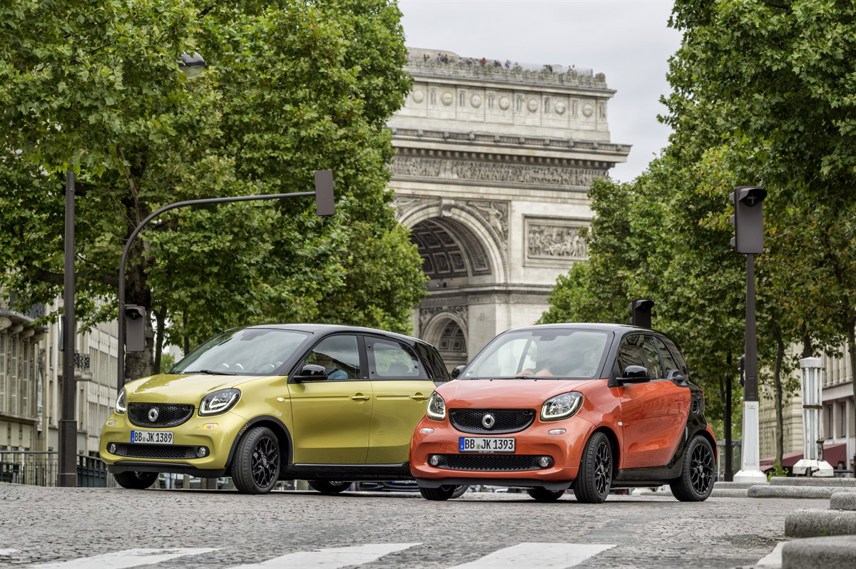Review
You wait eight years for a new Smart to launch then suddenly two come along at once. Perhaps that’s not entirely true – the production version of the electric Smart Fortwo appeared during the current car’s lifecycle. But while there was once a plan for a whole range of Smart cars, the range was pared back several years ago.
The Forwo continued with the second-generation model launching in 2006, while the first Forfour made a quiet exit at the end of its model life.
The original Forfour was a joint platform shared by former alliance partners Mitsubishi and Daimler, with the Mitsubishi Colt and Mercedes-Benz A-Class sharing components with the Smart model.
Car manufacturers increasingly need to find partners to share the costs of developing small cars, or produce them in a country where production costs are reduced by lower wages, because profit margins are narrow.
Daimler is forging ahead with a new partnership, expanding its cooperation with Renault for the Forfour. So far this agreement has led to Renault sharing LCV expertise to provide the Mercedes-Benz Citan van, plus a small diesel engine for the A-Class and B-Class, while Mercedes-Benz supplies a petrol and diesel engine to Renault Nissan Alliance partner Infiniti.
The engines in the Smart models can also be found in the Renault Twingo and Clio, while some interior components and features are common to Renault and Smart cars
Smart Fortwo 1.0 Proxy
The Smart Fortwo has a different look to mark out the third generation model, but has its predecessor’s compact length – 2,695mm – although it stands a little lower and 104mm wider.
One of the biggest changes compared with earlier versions is the adoption of a standard manual gearbox. The sequential manual with electronic gearshifts loathed by journalists, but accepted by Smart customers has been consigned to history. From spring 2015 the automatic option will be a dual-clutch gearbox, with much smoother and more rapid gearchanges than the previous auto.
The entry-level engine is a normally aspirated 1.0-litre three-cylinder engine producing 71hp, with a maximum 67lb-ft of torque at 2,850rpm.
This unit offers 68.9mpg on the combined cycle and has CO2 emissions of 93g/km. The alternative is a turbocharged 898cc engine producing 90hp and maximum torque of 100lb-ft at 2,500rpm. Fuel economy is only slightly worse at 67.3mpg on the combined cycle, while CO2 emissions are still below 100g/km at 97g/km. However, it feels a bit nippier on the road, and its 0-62mpg time of 10.4 seconds is four seconds faster than the 71hp car.
But 1.0-litre engine is fine for keeping pace with city traffic, and the three-cylinder motor is far more refined than in previous versions.
The whole car seems to have taken a step up in quality, with a neat design and an upmarket feel inside.
Three equipment grades are available: Passion is the entry level model, with standard 15-inch alloys, automatic climate control, leather-covered multi-function steering wheel, colour display screen, Isofix child seat mounting points and cruise control.
Two higher grades – Prime and Proxy – are priced at the same level. Prime comes with two-tone alloys, lane keeping assist, a panoramic glass roof, dashboard instrument pods, black leather seats, contrasting black and white trim and heated seats.
Proxy has cloth and Artico synthetic leather seats, and a blue and white contrasting colour scheme. In place of heated seats, there are larger alloy wheels, a chrome exhaust finisher, alloy pedals and a sports steering wheel.
All mosels come with crosswind assist, hill start assist and five airbags as standard.
Passion models start at £11,125 on the road, while Prime and Proxy are £11,820.
Author:
Fleet News
Specs
| Manufacturer | Smart |
| Model | ForTwo |
| Specification | |
| Model Year | 0.00 |
| Annual VED (Road tax) | £0 |
| BIK List Price | £11,765 |
| CO2 | 93g/km |
| BIK Percentage | 11% |
| Insurance Group | N/A |
| CC | N/A |
| Fuel Type | Petrol |
| Vehicle Type | |
| Luggage capacity (Seats up) | N/A |
Running Costs
| P11D | £11,765 |
| Cost per mile | 23.64ppm |
| Residual value | £4,125 |
| Insurance group | N/A |
| Fuel Type | Petrol |
| Cost per mile | 0.00ppm |
| Fuel | 0.00ppm |
| Depreciation | 0.00ppm |
| Service maintenance and repair | 0.00ppm |
Info at a glance
-
P11D Price
£11,765
-
MPG
68.9 -
CO2 Emissions
93g/km -
BIK %
11% -
Running cost
3 Year 60k : £4,125 4 Year 80k : £3,250 -
Fuel Type
Petrol
















